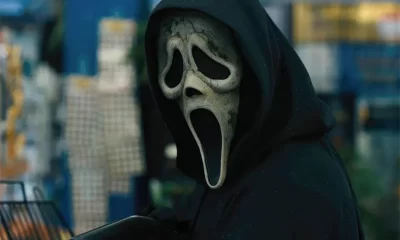News
Melissa Barrera and Jenna Ortega OUT of “Scream 7”; What’s Next For the Film?

The revamped and ultra-successful Scream franchise may be dead.
Over the long Thanksgiving weekend, actresses Melissa Barrera and Jenna Ortega reportedly left Scream 7 — one fired and one on her own accord. Spyglass, the studio that produces Scream, fired Barrera for what it says were antisemitic posts. Barrera had been posting support for Palestine and criticism against the Israeli government’s retaliatory violence in the wake of Hamas’s terrorist attacks last month. Shortly after Barrera’s firing, it was announced that Ortega would be leaving the project too.
Barrera and Ortega’s exits are a big deal for the franchise. The two have been a crucial part of Scream’s resurgence and cultural resonance. They made the horror series an astounding success and relevant again. In an industry dominated by IP and franchises, studios don’t just let their successful stars leave.
Hence, Barrera and Ortega’s departures raise a lot of questions: Why did Spyglass fire Barrera? What exactly was she posting, and was it as bad as Spyglass had made it out to be? Furthermore, did Ortega leave willingly as a sign of support for Barrera? What does this mean for their careers? And is there even a Scream franchise left?
Why did Spyglass fire Melissa Barrera from Scream 7?
News of Barrera’s firing was confirmed last week on November 21. Before her firing, Barrera was posting support for the Palestinian people and was criticizing the Israeli government’s attacks on the region, focusing specifically on the government’s responsibility for the bombings and deaths of Palestinian civilians. She wrote on Instagram stories (temporary posts) on October 22:
“I have been actively looking for videos and information about the Palestinian side for the last 2 weeks or so, following accounts etc. Why? Because western media only shows the other side. Why they do that, I will let you deduce for yourself. Usually, the algorithm on social media gets the gist. Well… my discover page on IG will only show me videos showing and talking about the Israeli side. Censorship is very real.”
Variety, which confirmed and broke the news of Barrera’s firing, initially reported that this post led to Barrera’s termination. The outlet stated that their sources believed Barrera’s questioning of the media coverage “floated an antisemitic trope that Jews control the media.” Later that day, a spokesperson at Spyglass Media told Variety that Barrera was dismissed for referring to Israel’s attacks on Palestine as “genocide”: “We have zero tolerance for antisemitism or the incitement of hate in any form, including false references to genocide, ethnic cleansing, Holocaust distortion or anything that flagrantly crosses the line into hate speech.”
The Spyglass statement about “false references to genocide [and] ethnic cleansing” seemed to cite an Instagram post in which Barrera shared an article from Jewish Currents magazine written by scholar Raz Segal. Jewish Currents is a left-leaning magazine, and Segal’s article was headlined “A Textbook Case of Genocide.” Segal, an Israeli historian, is the director of the master’s degree program in Holocaust and genocide studies at Stockton University.
:no_upscale()/cdn.vox-cdn.com/uploads/chorus_asset/file/25116562/1252036896.jpg)
As Barrera’s fans and critics of Spyglass’s decision pointed out profusely, criticizing media coverage of the Israel-Palestine conflict isn’t inherently antisemitic. Equating criticism automatically with antisemitism, and cracking down on dissent, is a worrying precedent that can result in political repression.
And as my colleague A.W. Ohlheiser pointed out, harmful misinformation runs rampant on social media and there are hardly any guardrails, especially on sites like X (formerly known as Twitter). And as the Washington Post reported, news organizations have come under fire and are still figuring out precise language to use in reporting on violence in the region. Earlier this month, Jazmine Hughes, an award-winning writer for the New York Times Magazine, resigned from the company after signing an open letter from US-based reporters that asked “Western newsroom leaders to be clear-eyed in coverage of Israel’s repeated atrocities against Palestinians.”
Labeling Barrera as antisemitic is a serious charge, as is stating that she was spreading the harmful trope of “Jewish people controlling the media.” While Barrera’s posts do question the media coverage and what images of the conflict have surfaced on social media, it leaps to call them blatantly antisemitic and evidence of hate speech.
In the hours following the news of her firing, Barrera posted a statement on Instagram: “First and foremost I condemn antisemitism and Islamophobia. I condemn hate and prejudice of any kind against any group of people,” she wrote.
:no_upscale()/cdn.vox-cdn.com/uploads/chorus_asset/file/25114926/Melissa_Barrera_instagram_story_112223_0ed85f6d7a0b4a3983146ece85c3b991.jpg)
“I pray day and night for no more deaths, for no more violence, and peaceful co-existence. I will continue to speak out for those who need it most and continue to advocate for peace and safety, human rights, and freedom. Silence is not an option for me,” she added.
Before her firing, Barrera had around a million Instagram followers. Today she has over 1.5 million. Barrera is continuing to post support for Palestinian people and denounce the Israeli government’s violence in the region.
What happens to Scream now?
Shortly after Barrera’s firing, trade publications reported that Jenna Ortega would not be returning to the franchise either. Some were extremely adamant (perhaps due to the optics and way in which Barrera was assertively fired) that Ortega’s departure had nothing to do with Barrera’s dismissal and everything to do with filming a second season of Wednesday, a Netflix project that Ortega has criticized in the past despite being its lead star.
Eagle-eyed fans pointed out that Ortega liked a pro-Palestine Instagram post on November 22 praising Barrera for standing her ground against Spyglass. Ortega’s commitment to Wednesday is the closest to an official reason for her departure, although there still has not been a confirmation of exactly why Ortega left Scream.
:no_upscale()/cdn.vox-cdn.com/uploads/chorus_asset/file/25116553/1471771622.jpg)
With both Barrera and Ortega out, Spyglass has effectively lost the core of its rebooted Scream franchise, as the two stars have been integral to both its plot and success.
Storywise, Barrera and Ortega play two sisters — Sam and Tara Carpenter — who are connected to the original Woodsboro murders. Sam is the daughter of Billy Loomis (Skeet Ulrich), the killer in the first Scream. Both Scream 5 and Scream 6 are about Sam’s realization about who her father is, her fears of inheriting his violent tendencies, and how her connection to him externally affects her relationship with Tara and their group of friends (Chad and Mindy Meeks-Martin, played by Mason Gooding and Jasmin Savoy Brown).
Scream 6, especially, was about how this group, a “core four,” would now carry on the Scream franchise as original characters Dewey Riley (David Arquette), Gale Weathers (Courteney Cox), and Sidney Prescott (Neve Campbell) were either killed off or given endings. Campbell, who has been the series’ main star for the first five movies, did not return for Scream 6 because of a salary dispute.
Without Barrera and Ortega, the current Scream story is effectively dead.
Barrera and Ortega have also been a part of the franchise’s box-office success. The reason that there’s a Scream 7 at all is because of how well Scream 5 and 6 did. Scream 6, released earlier this year, became the highest-grossing movie in the series domestically. It made over $108 million in its North American theatrical release and around $168 million worldwide. Ortega in particular has carved out a niche as a Gen-Z scream queen after appearing in horror and horror-adjacent projects like You, The Babysitter: Killer Queen, X, Scream, and Wednesday.
Letting these two crucial stars go is a precarious move for the franchise, especially when you consider the movie industry these days is so bent on mining IP and sustaining a successful franchise. Spyglass found that rare winning formula, and now will have to start from scratch. It’s also worth noting that the majority of Americans support a ceasefire in Gaza — a point that Barrera has been advocating for as well. Furthermore, Gen Z and millennials, like Barrera and the audiences Spyglass is courting with this new franchise, have shown more support for Palestine.
In an attempt to salvage Scream 7, Spyglass is reportedly reaching out to Neve Campbell to bring back the series’s original heroine, Sidney Prescott. Given the criticism that Spyglass is receiving and the positive feedback that Barrera and Ortega have gotten, it’s hard to see Campbell or any big star signing on in the wake of both Barrera and Ortega’s departures. And without Barrera and Ortega returning, it’s not a given that Scream’s audience would return either.






















